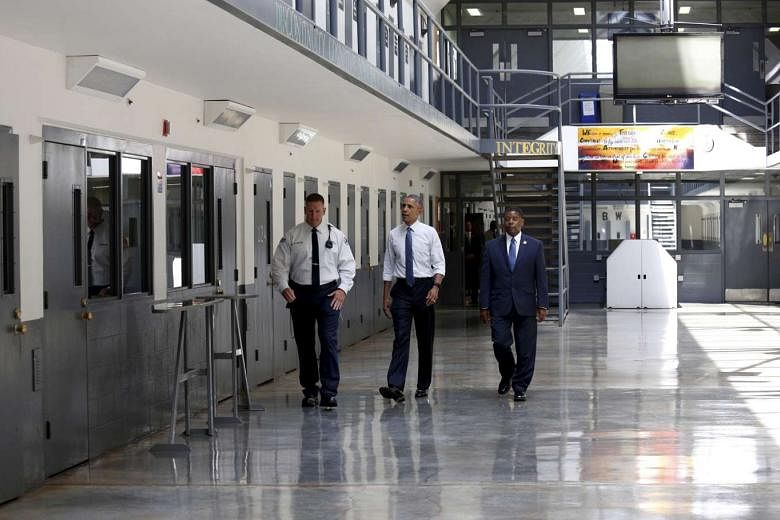WASHINGTON (AFP) - President Barack Obama met with top police officials and legal experts on Thursday (Oct 22) in a push to end "unnecessary incarceration" in a country where overpopulated prisons house 2.2 million people.
For years, the United States was of the mind that the longer offenders stayed behind bars, the less crime there would be. This led to the adoption in the 1980s and 1990s of tough mandatory minimum sentences that are now being widely criticised - including by the president.
"Democrats and Republicans were both responsible for wanting to look tough on the war on drugs and ramping up incarceration," Obama said in a speech on Wednesday in Charleston, West Virginia.
"For a long time, treatment was seen as a second class citizen to interdiction and arrest and incarceration. That mindset needs to change. The good news is we are seeing that mindset changing and it is on a bipartisan basis," he said.
Some of those due to meet with Obama at the White House Thursday afternoon are members of a new group that encompasses 130 top police chiefs, sheriffs, prosecutors and attorneys general from across the country.
High-profile members of the group, which calls itself "Law Enforcement Leaders to Reduce Crime and Incarceration," include the chiefs of the Los Angeles, New York City and Washington police departments.
LIFE ON SOCIETY'S MARGINS
"The same people we release from prison are the same people we return to prison, so they do spend their life banished from the tribe, they just do it on the instalment plan," said Dean Esserman, the police chief of New Haven, Connecticut.
A study published last year that focused on 30 US states showed that three-quarters of prisoners released from jail in the United States were arrested again within five years.
"We put people in prison for a very long time, we put them in prison for much longer than we did years ago, we put them in prison for much longer than countries like France, England or Italy put them in prison for the identical offense for the identical person," Esserman said.
"I am not sure we're getting better results," he added.
Since 1980, the US prison population has exploded by 800 per cent. Cells are overflowing with drug addicts, non-violent offenders or individuals suffering from psychiatric illnesses for whom a long stint behind bars often wipes out their chance for reintegration into society.
"We do regard drug dealing as a violent crime, but no one wants to see addiction being warehoused in our jails and prisons. That needs to be treated in treatment courts and through alternatives other than incarceration," Benjamin David, a North Carolina district attorney, told AFP.
CHANGE IN THE AIR
In a sign that change is in the air, the United States will release, starting at the end of next week, several thousand prisoners considered at low risk of becoming repeat offenders.
The move will apply mainly to inmates convicted of minor drug offenses, some of whom have been incarcerated for more than 20 years. Over time, more than 46,000 prisoners could see their sentences reduced.
But that will leave little more than a dent in a costly prison system that, with 2.2 million inmates, encompasses a quarter of the world's prisoners.
"If you release everyone in prison today in America, except for rapists and murderers, we would still have a higher rate of incarceration than in Germany," David said.
Ronal Serpas, retired police chief of New Orleans, said people were spending "incredibly long times" on relatively low level crimes because of mandatory minimum sentencing, "and we have not stopped and collectively looked back at that until just within the last year or two."
"We may have been big advocates of mass arrests 20 years ago but we've learned, we've gotten smarter," he told AFP.

